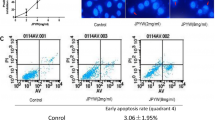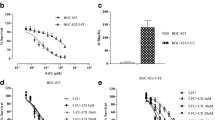Abstract
Recent studies hint that Ginsenoside is involved in cancer prevention and treatment. In this study, we investigated the effect of Ginsenoside Rh2 on drug resistance in human colorectal carcinoma (CRC) cells and its mechanism. The resistance reversion effect of Ginsenoside Rh2 in CRC cells was analyzed using CCK-8 assay. After treating with Ginsenoside Rh2, the cell cycle distribution and cellular apoptosis were analyzed by flow cytometry, cell migration was determined by transwell migration assay, the expression of drug-resistance genes and proteins were evaluated using quantitative real-time polymerase chain reaction (qRT-PCR) and Western blot, respectively. Ginsenoside Rh2 could enhance the cytotoxicity of 5-FU in drug-resistant CRC cells (LoVo/5-FU and HCT-8/5-FU). Treatment with Ginsenoside Rh2 could result in an increase of cell numbers in G0/G1 phase accompanied with a decrease in S-phase, and induced cellular apoptosis in drug-resistant CRC cells. In addition, the migration process and EMT process of drug-resistant CRC cells were suppressed by treatment of Ginsenoside Rh2. Compared to control group, expression of drug-resistance genes, such as MRP1, MDR1, LRP and GST, were negatively correlated to Ginsenoside Rh2. All these results indicated that Ginsenoside Rh2 could effectively reverse drug resistance in human colorectal carcinoma cell and its mechanism involved the prevention of cellular proliferation and migration, the promotion of cellular apoptosis and the alteration of drug-resistance genes, which suggested that Ginsenoside Rh2 may act as a promising candidate for drug resistance in human colorectal carcinoma chemotherapy.





Similar content being viewed by others
References
Ferlay J, Soerjomataram I, Dikshit R, et al. Cancer incidence and mortality worldwide: sources, methods and major patterns in GLOBOCAN 2012. Int J Cancer. 2015;136:E359–86.
Seow HF, Yip WK, Fifis T. Advances in targeted and immunobased therapies for colorectal cancer in the genomic era. Onco Targets Ther. 2016;9:1899–920.
Panczyk M. Pharmacogenetics research on chemotherapy resistance in colorectal cancer over the last 20 years. World J Gastroenterol. 2014;20:9775–827.
De Mattia E, Cecchin E, Toffoli G. Pharmacogenomics of intrinsic and acquired pharmacoresistance in colorectal cancer: toward targeted personalized therapy. Drug Resist Updat. 2015;20:39–70.
Xiang Z, Kang QJ, Xiang X. Gene and protein expression in the oxaliplatin-resistant HT29/L-OHP human colon cancer cell line. Genet Mol Res. 2015;14:11013–22.
Wu S, Wen F, Li Y, et al. PIK3CA and PIK3CB silencing by RNAi reverse MDR and inhibit tumorigenic properties in human colorectal carcinoma. Tumour Biol. 2016;37:8799–809.
Khaleel SA, Al-Abd AM, Ali AA, et al. Didox and resveratrol sensitize colorectal cancer cells to doxorubicin via activating apoptosis and ameliorating P-glycoprotein activity. Sci Rep. 2016;6:36855.
Sui H, Zhou LH, Zhang YL, et al. Evodiamine Suppresses ABCG2 Mediated Drug Resistance by Inhibiting p50/p65 NF-kappaB Pathway in Colorectal Cancer. J Cell Biochem. 2016;117:1471–81.
Jin X, Che DB, Zhang ZH, et al. Ginseng consumption and risk of cancer: a meta-analysis. J Ginseng Res. 2016;40:269–77.
Xie J, Shao J, Lu Y, et al. Separation of ginseng active ingredients and their roles in cancer metastasis supplementary therapy. Curr Drug Metab. 2013;14:616–23.
Xu FY, Shang WQ, Yu JJ, et al. The antitumor activity study of ginsenosides and metabolites in lung cancer cell. Am J Transl Res. 2016;8:1708–18.
Dong H, Bai LP, Wong VK, et al. The in vitro structure-related anti-cancer activity of ginsenosides and their derivatives. Molecules. 2011;16:10619–30.
Wu N, Wu GC, Hu R, et al. Ginsenoside Rh2 inhibits glioma cell proliferation by targeting microRNA-128. Acta Pharmacol Sin. 2011;32:345–53.
Park HM, Kim SJ, Kim JS, et al. Reactive oxygen species mediated ginsenoside Rg3- and Rh2-induced apoptosis in hepatoma cells through mitochondrial signaling pathways. Food Chem Toxicol. 2012;50:2736–41.
Xia T, Wang JC, Xu W, et al. 20S-Ginsenoside Rh2 induces apoptosis in human Leukaemia Reh cells through mitochondrial signaling pathways. Biol Pharm Bull. 2014;37:248–54.
Han S, Jeong AJ, Yang H, et al. Ginsenoside 20(S)-Rh2 exerts anti-cancer activity through targeting IL-6-induced JAK2/STAT3 pathway in human colorectal cancer cells. J Ethnopharmacol. 2016;194:83–90.
Xie X, Eberding A, Madera C, et al. Rh2 synergistically enhances paclitaxel or mitoxantrone in prostate cancer models. J Urol. 2006;175:1926–31.
Zhou B, Xiao X, Xu L, et al. A dynamic study on reversal of multidrug resistance by ginsenoside Rh(2) in adriamycin-resistant human breast cancer MCF-7 cells. Talanta. 2012;88:345–51.
Yang J, Yuan D, Xing T, et al. Ginsenoside Rh2 inhibiting HCT116 colon cancer cell proliferation through blocking PDZ-binding kinase/T-LAK cell-originated protein kinase. J Ginseng Res. 2016;40:400–8.
Chen Y, Liu ZH, Xia J, et al. 20(S)-ginsenoside Rh2 inhibits the proliferation and induces the apoptosis of KG-1a cells through the Wnt/beta-catenin signaling pathway. Oncol Rep. 2016;36:137–46.
Thwaites MJ, Cecchini MJ, Passos DT. Interchangeable roles for E2F transcriptional repression by the retinoblastoma protein and p27KIP1-cyclin-dependent kinase regulation in cell cycle control and tumor suppression. Mol Cell Biol. 2017;37:e00561–616.
Wang N, Wei H, Yin D, et al. MicroRNA-195 inhibits proliferation of cervical cancer cells by targeting cyclin D1a. Tumour Biol. 2016;37:4711–20.
Xiong L, Tang Y, Liu Z, et al. BCL-2 inhibition impairs mitochondrial function and targets oral tongue squamous cell carcinoma. Springerplus. 2016;5:1626.
Gao J, Yan Q, Liu S, et al. Knockdown of EpCAM enhances the chemosensitivity of breast cancer cells to 5-fluorouracil by downregulating the antiapoptotic factor Bcl-2. PLoS One. 2014;9:e102590.
Vegran F, Boidot R, Oudin C, et al. Overexpression of caspase-3 s splice variant in locally advanced breast carcinoma is associated with poor response to neoadjuvant chemotherapy. Clin Cancer Res. 2006;12:5794–800.
Ueda M, Iguchi T, Nambara S, et al. Overexpression of transcription termination factor 1 is associated with a poor prognosis in patients with colorectal cancer. Ann Surg Oncol. 2015;22(Suppl 3):S1490–8.
Gao HX, Yan L, Li C, et al. miR-200c regulates crizotinib-resistant ALK-positive lung cancer cells by reversing epithelial-mesenchymal transition via targeting ZEB1. Mol Med Rep. 2016;14:4135–43.
Schwab R, Micsik T, Szokoloczi O, et al. Functional evaluation of multidrug resistance transporter activity in surgical samples of solid tumors. Assay Drug Dev Technol. 2007;5:541–50.
Schmitt SM, Stefan K, Wiese M. Pyrrolopyrimidine derivatives and purine analogs as novel activators of Multidrug Resistance-associated Protein 1 (MRP1, ABCC1). Biochim Biophys Acta. 2017;1859:69–79.
Torres A, Vargas Y, Uribe D, et al. Adenosine A3 receptor elicits chemoresistance mediated by multiple resistance-associated protein-1 in human glioblastoma stem-like cells. Oncotarget. 2016;7:67373–86.
Gao M, Miao L, Liu M, et al. miR-145 sensitizes breast cancer to doxorubicin by targeting multidrug resistance-associated protein-1. Oncotarget. 2016;7:59714–26.
Samanian S, Mahjoubi F, Mahjoubi B, et al. MDR1 gene polymorphisms: possible association with its expression and clinicopathology characteristics in colorectal cancer patients. Asian Pac J Cancer Prev. 2011;12:3141–5.
Januchowski R, Sterzynska K, Zaorska K, et al. Analysis of MDR genes expression and cross-resistance in eight drug resistant ovarian cancer cell lines. J Ovarian Res. 2016;9:65.
Chen YL, Yang TY, Wu CL, et al. Mechanisms underlying lung resistance-related protein (LRP)-mediated doxorubicin resistance of non-small cell lung cancer cells. Chin J Physiol. 2016;59:331–47.
Zhang W, Zhou H, Yu Y, et al. Combination of gambogic acid with cisplatin enhances the antitumor effects on cisplatin-resistant lung cancer cells by downregulating MRP2 and LRP expression. Onco Targets Ther. 2016;9:3359–68.
Bernig T, Ritz S, Brodt G, et al. Glutathione-S-transferases and chemotherapy resistance of Hodgkin’s lymphoma cell lines. Anticancer Res. 2016;36:3905–15.
Liu S, Liu F, Jia H, et al. A glutathione S-transferase gene associated with antioxidant properties isolated from Apis cerana cerana. Naturwissenschaften. 2016;103:43.
Author information
Authors and Affiliations
Corresponding author
Ethics declarations
Conflict of interest
The authors declare that they have no conflict of interest.
Rights and permissions
About this article
Cite this article
Liu, Gw., Liu, Yh., Jiang, Gs. et al. The reversal effect of Ginsenoside Rh2 on drug resistance in human colorectal carcinoma cells and its mechanism. Human Cell 31, 189–198 (2018). https://doi.org/10.1007/s13577-017-0189-3
Received:
Accepted:
Published:
Issue Date:
DOI: https://doi.org/10.1007/s13577-017-0189-3




